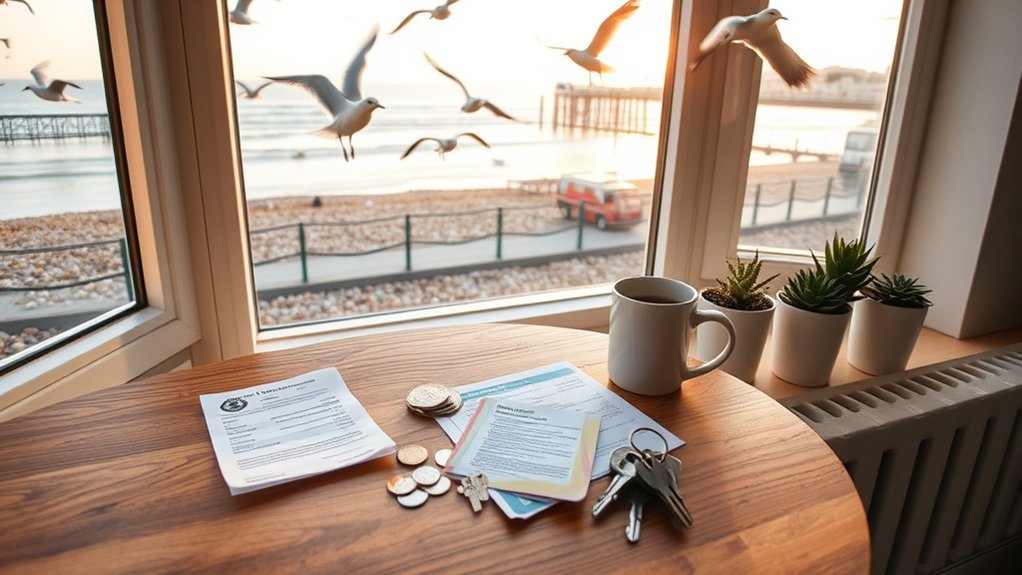You’ll typically need about £2,270–£3,100 a month in Brighton & Hove to cover rent, bills, food and everyday living, depending on apartment size and location. Expect one‑bed rents around £1,375 city‑centre or £1,143 outside, while three‑beds run £2,450 city‑centre and £1,950 outside. Add utilities (~£200/month), internet and mobile (~£40–£60), groceries and occasional dining out. Budgeting with a contingency is sensible, and more detailed line‑items and tips follow below.
Monthly Budget Breakdown for a Single and a Family of Four
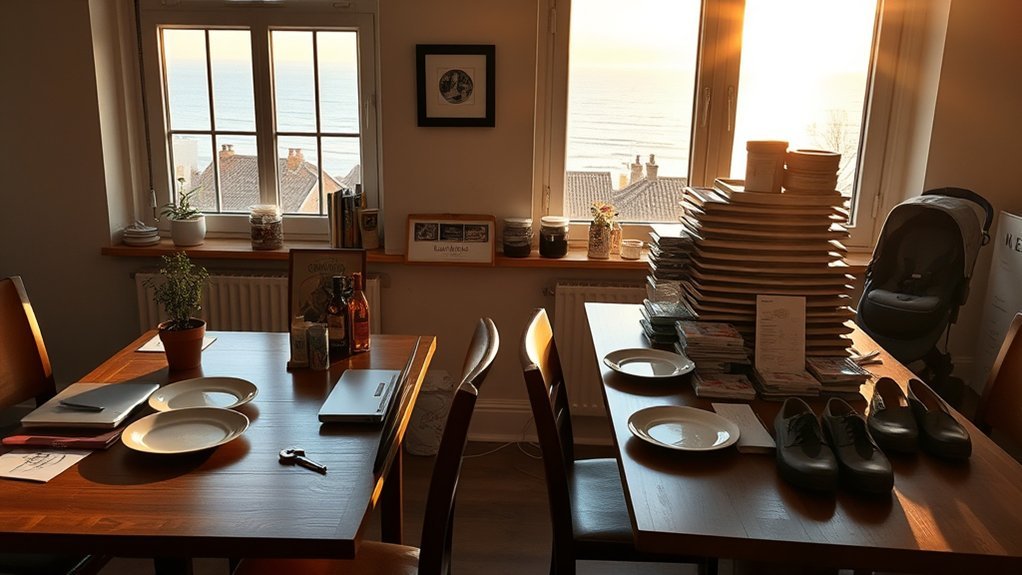
How much will you need to live comfortably in Brighton & Hove? You’ll want to plan a realistic Brighton cost breakdown: for a single person (excluding rent) expect about £898.60 monthly, while a family of four will need roughly £3,158.70.
Plan for Brighton living: about £898.60 monthly for a single, or £3,158.70 for a family of four (excluding rent)
Your monthly budget should include transport—season pass ~£96.10 or one-way ~£2.80—plus utilities for an 85m2 place averaging £199.44 and internet ~£29.04.
Groceries and dining push totals higher; staples like milk, bread, eggs and local cheese form the baseline of food spending.
These figures exclude rent, so add housing costs separately when modeling full cost of living. Use the single and family estimates to compare scenarios: scale food and transport for household size, keep utility and internet figures as steady per-home costs, and adjust discretionary spending to meet your comfort target.
This gives you a concise, data-driven monthly budget to plan living in Brighton & Hove.
Rent and Housing: Prices by Apartment Size and Neighbourhood
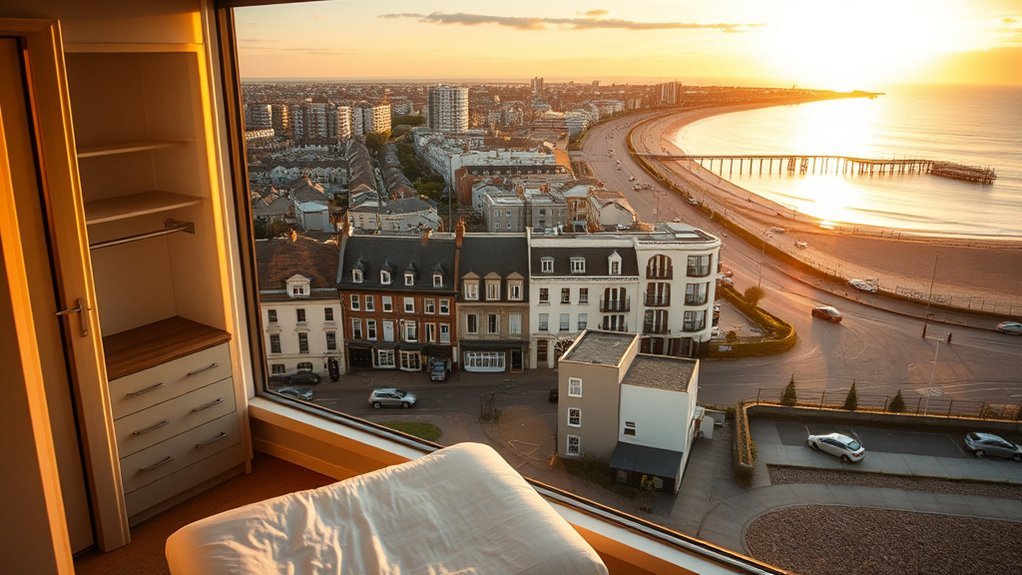
Now that you’ve got a monthly budget for living expenses, factor in housing—your biggest variable. You’ll see a consistent premium for city centre living in Brighton: a 1-bedroom costs about £1,375 in the centre versus £1,143 outside, and a 3-bedroom averages £2,450 in the centre versus £1,950 outside. Buying follows similar geography: price per m² is roughly £6,483 central and £4,953 outside. Use these figures to decide trade-offs between commute, space and neighbourhood amenities.
| Type | Typical monthly / price per m² |
|---|---|
| 1-bed (city centre) | £1,375 |
| 1-bed (outside) | £1,143 |
| 3-bed (city centre) | £2,450 |
| 3-bed (outside) | £1,950 |
| Price per m² (buying) | £6,483 centre / £4,953 outside |
Plan around Rent and Housing costs as the main driver of your Brighton budget; choose location based on affordability versus lifestyle priorities.
Utilities, Internet and Household Bills
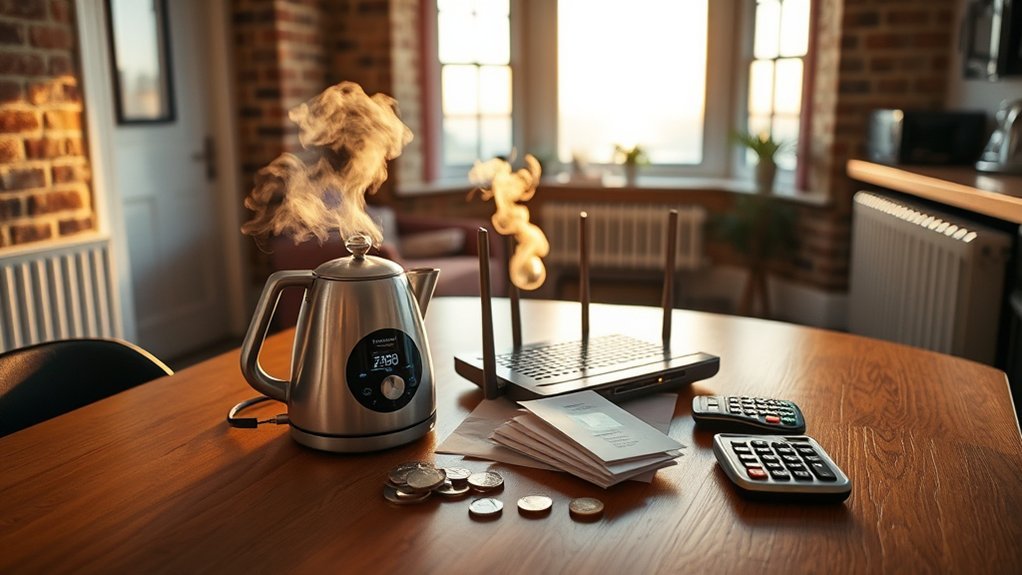
You’ll typically pay about £200–£240 a month for basic utilities and connectivity in Brighton & Hove, with individual estimates around £199–£208 for an 85m2 apartment and roughly £29 for unlimited broadband.
Mobile plans add about £12 monthly, so plan on utilities, internet and phone together totaling roughly £220–£250 depending on usage and supplier.
Next we’ll break down what’s included, common extras and ways to trim those bills.
Typical Monthly Utilities
Looking for a clear picture of monthly household bills in Brighton & Hove? You’ll find utilities are a predictable part of your monthly expenses. For a typical apartment (around 85 m2 / 915 sq ft) expect basic utilities—electricity, heating, water, garbage—around £199–£208 per month. That’s the core recurring cost beyond rent.
- Basic utilities (electricity, heating, water, garbage): ~£199–£208/month
- Internet (60 Mbps+ unlimited): ~£29.04/month — noted separately below
- Mobile plan: ~£12.00/month — separate from household utilities
- Primary monthly expenses focus: electricity, heating, water, internet
You’ll budget about £230–£250 monthly if you combine core utilities with a typical home internet plan; adjust for usage, season, and energy prices.
Internet and Phone Costs
Curious how much you’ll pay to stay connected in Brighton & Hove? You can expect internet service for a 60 Mbps+ unlimited plan to run about £28.15 per month. Mobile plans are modestly priced too, averaging roughly £12.00 monthly, so combined connectivity typically totals around £40–£45 depending on promos and bundling.
Remember to factor these into your broader utilities budget: basic utilities for a 915 sq ft apartment average £207.53 per month (electricity, heating, water, garbage), and central one-bedroom rents of £1,375 increase demand-driven costs. Overall, internet and mobile plans sit in the mid-range of living expenses, contributing a noticeable portion of monthly bills but remaining manageable if you compare providers and consider package deals.
Household Essentials & Extras
How much will your monthly essentials add to rent in Brighton & Hove? You’ll typically pay steady utilities alongside rent: basic utilities for an 85m2 apartment run about £199.44/month, while average utilities for a 915 sq ft setup are ~£207.53/month. Internet plans (60 Mbps+, unlimited) cost ~£28.15–£29.04/month. Annual combined utilities and internet for a 1‑bed city‑centre place falls in roughly £1,300–£1,720, depending on usage.
- Basic utilities (85m2): £199.44/month
- Average utilities (915 sq ft): £207.53/month
- Internet (60 Mbps+): £28.15–£29.04/month
- Annual combined (1‑bed): £1,300–£1,720
Use these figures to budget utilities, internet, and rent realistically.
Food and Grocery Costs: Typical Items and Weekly Shop
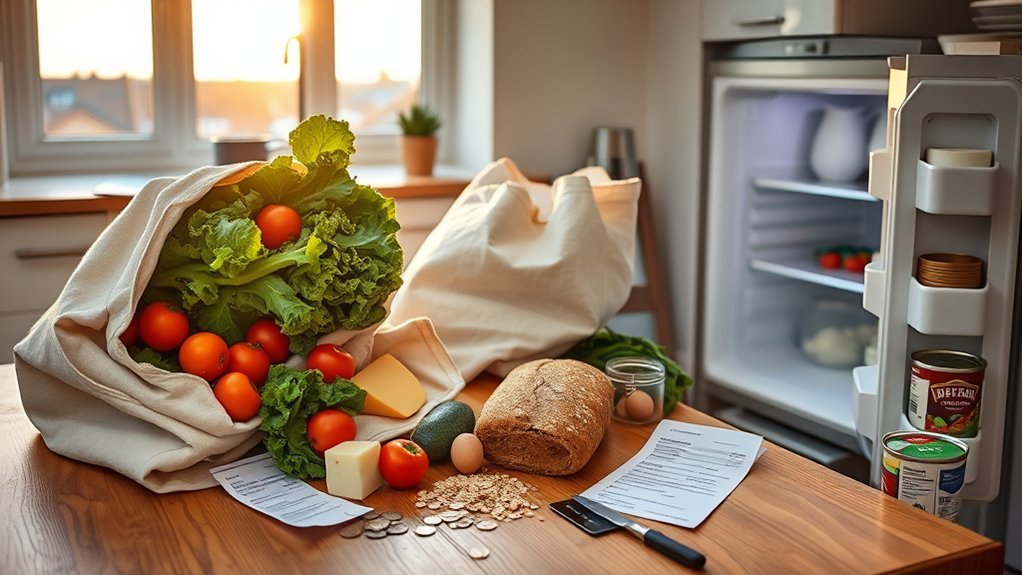
You’ll find a weekly supermarket basket (milk, bread, eggs, cheese, fruit/veg) typically fits within the given price ranges, showing groceries are generally modest compared with eating out.
A mid-range three-course meal for two averages about £50, while a cappuccino is roughly £3.31–£6.05, so occasional cafés and restaurants add up quickly.
Staples like milk (~£1.43–£4.73/gal), bread (~£1.28–£1.47/loaf), eggs (~£3.56/dozen) and cheese (~£9.70–£9.95/kg) give you concrete benchmarks for planning weekly spend.
Weekly Supermarket Basket
Wondering what a typical weekly shop in Brighton & Hove looks like on your receipt? You’ll find a practical weekly basket of staples that balances cost and nutrition. Core groceries often include eggs, milk, bread, rice and local cheese; prices range—eggs ~£3.56–£3.64 per dozen, milk ~£1.43 per litre, bread ~£1.28–£1.47 per 500g, rice ~£0.69–£1.28 per kg and cheese ~£5.83 per 500g. Fruit and drinks add variety: apples ~£2.03/kg, 0.5L domestic beer ~£2.03. Typical spend for basic staples lands around £15–£25 depending on brands and portions. Use this data-driven list to plan a weekly shop efficiently.
- Eggs, milk, bread, rice
- Cheese (local)
- Fruit (apples)
- Beverage (domestic beer)
Eating Out Costs
Curious what eating out will do to your weekly budget in Brighton & Hove? Dining-out costs here are measurable: a mid-range three-course meal for two runs about £50, so one dinner out weekly adds ~£50. Coffee lovers pay roughly £3.31–£6.05 per cappuccino, and pub beer jumps to ~£7.50 for 0.5L (or £1.78–£2.03 in shops). If you mix dining-out with occasional takeaway coffees and beers, plan an extra £15–£60 weekly depending on frequency. Compare that to your grocery-driven weekly shop (staples like milk, bread, eggs, cheese, fruit, veg) which totals in the low hundreds for a family; eating out can thus be a significant, predictable slice of overall living costs.
Staple Item Prices
How much will a basic weekly shop set you back in Brighton & Hove? You can plan tightly using local prices: bread is about 1.47£, milk 1.43£ per litre, and a dozen eggs 3.56£. A simple weekly basket (bread, milk, eggs, rice, cheese, apples, potatoes, drinks) typically totals modestly if you stick to basics.
- Bread (1 loaf) — 1.47£
- Milk (1 L) — 1.43£
- Eggs (12) — 3.56£
- Rice (1 kg) — 1.28£
Add cheese (9.70£/kg), apples (2.03£/kg), and beverages like beer (2.03£/0.5 L) or cola (2.17£/2 L) to scale weekly spend. Use these figures to budget reliably.
Eating Out, Coffee and Nightlife Expenses
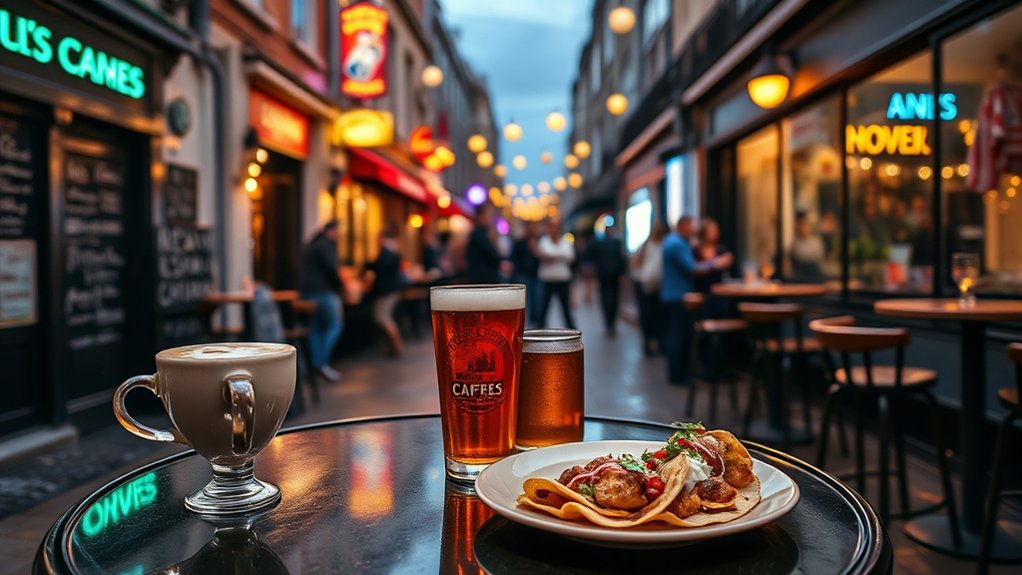
Looking for quick benchmarks for eating out and nightlife in Brighton & Hove? You’ll find Brighton dining costs range from budget to mid-range: a cheap restaurant meal is about £15, while a mid-range three-course dinner for two runs roughly £50–£67 depending on drinks and tipping. Café culture is strong — expect a cappuccino around £3.31 and bottled water £0.80–£1.00 — so daily coffee habits add up predictably.
Nightlife prices vary by venue and location. A domestic 0.5L beer in supermarkets is about £2.03, while a pint in pubs typically falls between £4 and £5; city-centre bars usually sit at the higher end. A 2L Coca-Cola at £2.04 highlights inexpensive mixer options if you’re hosting.
Plan by mixing budget and mid-range choices: eat out in less central spots to save, use cafés for quick meals, and anticipate pub prices rising toward the seafront and popular nightlife hubs.
Transport: Public Transit, Fuel and Taxi Fares
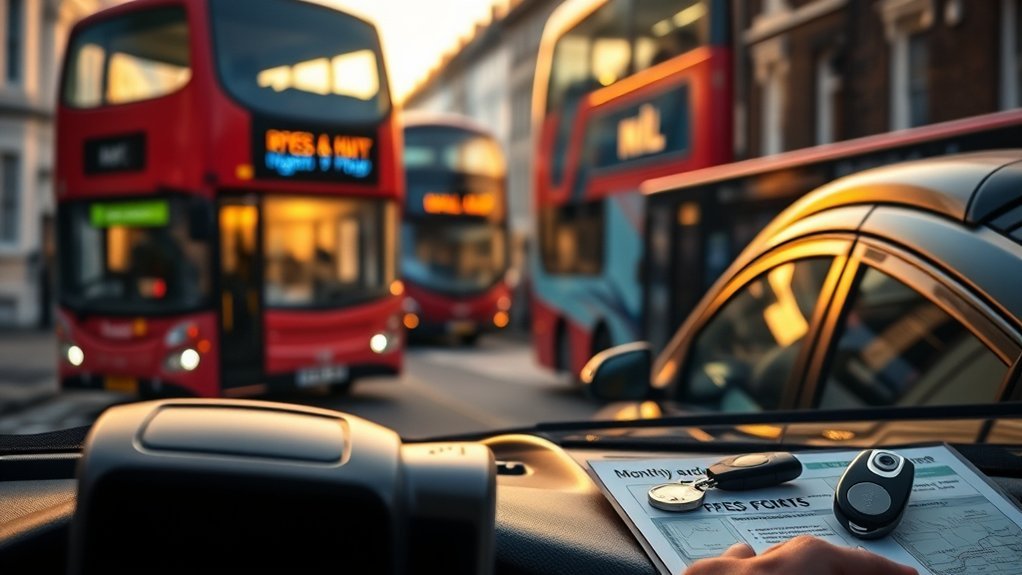
Want to get around Brighton affordably? You’ll find practical choices between public transit, fuel and taxis that affect your monthly budget. Use monthly passes if you commute — they cost about 85.98–96.10£ and usually save money versus daily tickets (single fares ~2.50–2.80£). If you drive, factor gasoline at roughly 5.66–5.70£ per gallon.
- Compare monthly passes to pay-as-you-go if you ride more than twice daily.
- Combine bus and rail options for fastest routes; passes often cover both.
- Budget for occasional taxi fares: typical weekday trips range widely, ~16–69£ depending on distance and time.
- Use taxis sparingly for late nights or heavy luggage to avoid large monthly variances.
Brighton’s transport costs sit above cities like Manchester but below London overall. Track your trip frequency for a clear decision between monthly passes, driving, or relying on taxis to control monthly transport spending.
Healthcare, Personal Care and Household Essentials
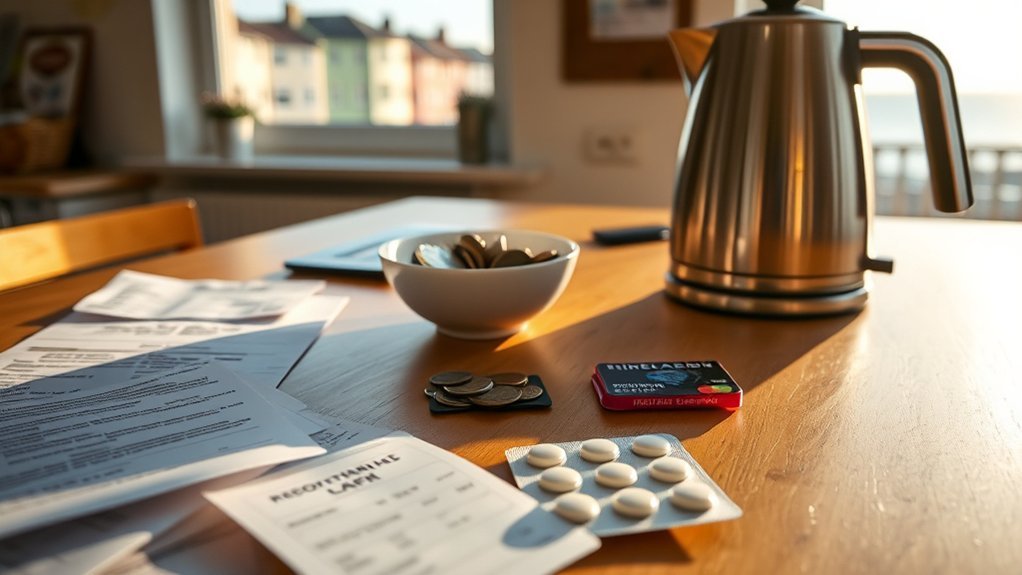
After you’ve mapped out transport costs, factor in day-to-day health and home items that steadily impact your monthly spend. You’ll want to budget for occasional private healthcare — a 15-minute private doctor visit in Brighton averages £69 — plus common personal care buys and household essentials you replace regularly. Expect routine purchases: cold medicine for six days £3.63, tampons (32) £3.45, deodorant (50 ml) £1.87, 2-in-1 shampoo (400 ml) £3.55. For basics at home, 4 rolls of toilet paper cost about £1.92, 2L Coca‑Cola £2.17, and laundry detergent (3 L) roughly £1.45.
| Item category | Example price |
|---|---|
| Private doctor (15 min) | £69.00 |
| Personal care bundle | £3.45–£3.63 |
| Grooming products | £1.87–£3.55 |
| Household essentials | £1.45–£2.17 |
Use these figures to create a monthly buffer for healthcare, personal care, and household essentials so small purchases don’t upset your budget.
Entertainment, Gyms and Leisure Activities

You’ll find gym memberships in Brighton & Hove average about £46/month for a standard facility, with additional class fees depending on the studio.
Nightlife and bars vary widely in price, and occasional costs like an 8 km weekday taxi (~£16) or private doctor visits (~£69) can affect your leisure budget.
Cultural events at venues like the Theatre Royal and Komedia add paid-ticket options that should be factored into monthly entertainment planning.
Gym Memberships and Classes
How much will regular gym access add to your monthly budget in Brighton & Hove? You’ll pay about £46 for a standard gym membership, a fixed item in your entertainment and leisure spend. Factor in class add-ons and private sessions if you want structured training.
- Monthly gym base cost: ~£46.
- Group classes or premium studio passes: variable above base.
- Occasional private PT or health consults: e.g., a 15-minute private doctor visit ~£69 (shows ancillary costs).
- Small recurring personal care items: cold medicine £3.63, toothpaste £1.36.
You should budget gym membership as a predictable monthly commitment and add a buffer for classes, personal training, or health-related expenses to avoid surprises.
Nightlife and Bars
If you’re balancing a gym habit with a social life, budget for nights out as a separate predictable line: expect a domestic pint to cost about £2.03–£2.50 and café drinks like cappuccinos around £3–£3.31, while theatre, comedy and live-music venues add variable ticket costs. You’ll find nightlife concentrated around seafront and central areas, with pubs and bars offering affordable options compared with larger UK cities. Factor in a gym at roughly £46/month if you want regular classes plus occasional nights out. Include transport — an 8 km taxi on a business day runs about £16 — when planning late returns. Overall, Brighton’s nightlife and drinks scene is lively yet budget-manageable if you track spending.
Cultural Events and Tickets
Curious what cultural outings will cost in Brighton & Hove? You’ll find vibrant cultural events within easy reach of Kemp Town and Brighton seafront nightlife, but expect mixed costs. Tickets for theater or comedy typically range depending on venue and seating; budget for mid-tier shows. Factor in related leisure expenses—gym membership £46/month, private doctor visit £69, and taxis (~£16 for 8 km) if you travel after shows. Supermarket beer (£2.03/0.5L) and a mid-range meal for two (~£50) help you gauge incidental spending.
- Theater/comedy tickets: variable, budget mid-range.
- Transport: taxi ~£16 (8 km).
- Gym: £46/month.
- Dining/drinks: £50 meal; £2.03 beer.
Job Market, Salaries and Key Industries
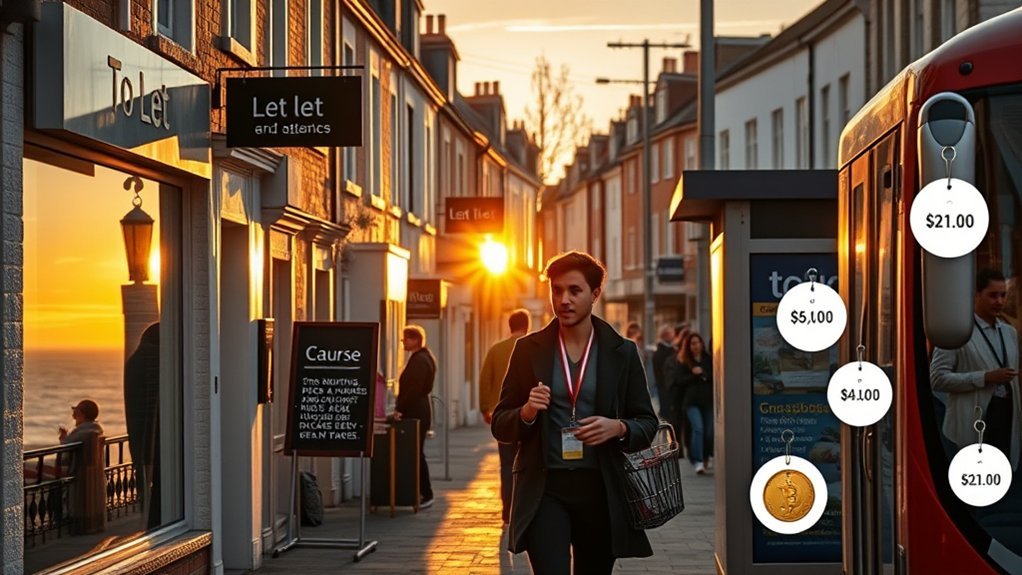
Wondering whether Brighton can support your career ambitions? You’ll find competitive salaries tied to a booming digital sector and diverse industries. Brighton’s economy blends digital, retail and tourism; about 20% of jobs sit in creative industries and over 1,000 tech/digital firms operate locally. American Express is the largest private employer with ~3,000 staff, and more than 25,000 residents work freelance. Demand for multilingual skills is high because of overseas client work.
| Sector | Notes |
|---|---|
| Digital & Tech | 1,000+ companies, strong pay potential |
| Creative | ~20% of jobs, freelance-friendly |
| Corporate | American Express ~3,000 employees |
| Tourism & Retail | Seasonal demand, supports local jobs |
Expect salaries above northern cities but below London; cost of living index is 62.1 versus London’s 81.4. You’ll want to target digital or corporate roles for higher earnings, and consider freelance or multilingual niches for steady work.
Money Tips for Newcomers: Banking, Transfers and Saving Strategies
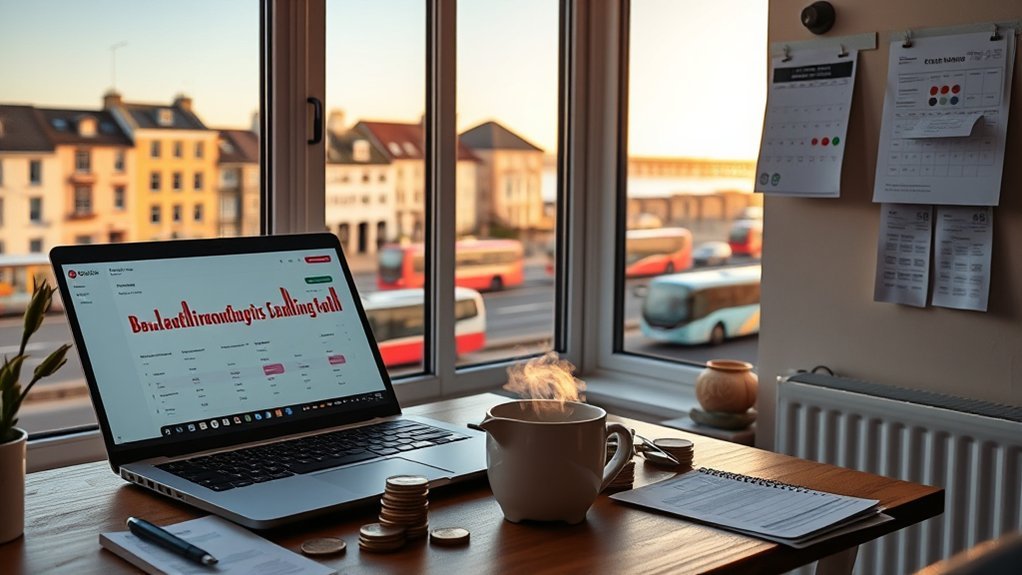
Having a clear money plan will help you make the most of Brighton’s salary opportunities—especially if you’re targeting digital or corporate roles—so start by mapping income against typical local costs. You’ll want to budget the typical £898.60 monthly non-rent spend, add rent for your area, then build Savings targets from what’s left. Use costed line items (transport £96.10, utilities £199.44, internet £29.04) to set realistic monthly goals.
- Open a UK current account with fee-free debit and good online banking to track spending.
- Use Wise for low-cost international Transfers—compare fees and FX before sending remittances to keep more of your pay.
- Automate Savings: set a standing order to a separate easy-access account right after payday to enforce discipline.
- Review quarterly: adjust targets for rent changes and unexpected bills; aim for a contingency buffer of 1–2 months’ non-rent expenses.
These steps keep your cashflow visible, reduce transfer costs, and grow emergency Savings efficiently.
Frequently Asked Questions
How Much Are Bills a Month in Brighton?
Bills monthly in Brighton typically run £200–£210 for utilities and internet; include rent costs and living expenses, and you’ll often add a £86–£96 transport pass, so budget roughly £300–£1,200+ depending on rent.
How Much Is the Cost of Living in Brighton, UK?
Brighton’s cost of living is moderate: you’ll compare expenses to London, expect housing affordability challenges with average city-centre rent ~£1,375, and use student budgeting to prioritize rent, bills, groceries, and transport.
Is It Expensive to Live in Hove?
Yes — you’ll find it moderately pricey: housing costs are high, utility bills add ≈£199 monthly, groceries budget’s above average, and combined expenses make Hove pricier than many UK cities though still cheaper than London.
What Is the Average Cost of Living in the UK per Month With Rent?
You’d typically spend around £1,500–£2,000 monthly including rent; city living pushes costs higher. Track rent trends, use budgeting tips like fixed bills, transport passes, and meal planning to manage expenses.
Conclusion
You’ll find Brighton & Hove offers a mix of seaside lifestyle and realistic costs: average one‑bed rents ~£1,100–£1,400/month while a family of four can budget ~£3,000–£3,500/month all‑in. Notably, public transport and groceries are about 10–15% cheaper than London, so your disposable income stretches further. Use local banks, monthly budgeting apps and a 3‑month emergency fund to manage seasonal tourism peaks and housing variability—practical, data‑led steps you can start today.

